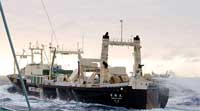Environment fears raised after Japanese whaling ship catches fire in Antarctic waters
Officials warned of a potential environmental disaster in Antarctica after fire erupted Thursday on a Japanese whaling ship, leaving it crippled and drifting near penguin breeding grounds on the frozen continent's coast.

New Zealand Conservation Minister Chris Carter, whose country was leading efforts to help the stricken ship, said it was carrying 500,000 liters (132,000 gallons) of heavy oil and 800,000 liters (211,000 gallons) of furnace oil and was starting to list from water pumped aboard to fight the fire.
"It is a serious situation ... a ship badly damaged and full of toxic oil," Carter told National Radio.
No oil had spilled from the ship and it was in no immediate danger of sinking, officials said.
Japanese officials said the blaze that broke out in the below-decks area of the ship where whale carcasses are processed had been brought under control.
Most of the 148-member crew of the 8,000-ton (7,280-metric ton) Nisshin Maru were evacuated Thursday to three other ships in the Japanese whaling fleet in the area, said Hideki Moronuki, an official with the Japan Fisheries Agency.
One crewman, named by Moronuki as 27-year-old Kazutaka Makita, was still missing almost 12 hours after New Zealand officials received the ship's distress signal at 5:15 a.m. Thursday (1615 GMT Wednesday).
Hatches were closed to seal off the burning area, and some 30 crew members stayed on board to fight the fire, pumping water from the surrounding ocean, Moronuki said.
Steve Corbett, a spokesman for Maritime New Zealand, said his agency had been in constant contact with the ship's captain and was on standby to send ships to help.
"The ship has lost all engine power," Corbett said. "The crew are still fighting it but ... they are confident it won't sink and the fire won't spread further."
The cause of the fire was not immediately known.
Japanese officials believe the missing crewman is inside the ship, Corbett said.
The ship was drifting 175 kilometers (110 miles) from Antarctica's Cape Adare, the world's largest penguin breeding rookeries with some 250,000 breeding pairs, Antarctica New Zealand chief executive Lou Sanson said.
"It's a long way off the coast but the currents do go that way. We're very concerned about what could happen," Sanson told The Associated Press.
He said the ship was far from help and in a "high energy environment where you get a lot of storms." Conditions stayed calm Thursday.
Carter contacted his counterparts in Japan, Australia, United States and Britain other signatories to the Antarctic Treaty with responsibility for protecting its environment in case "an international environmental response is needed," ministerial spokesman Nick Maling said.
"We are also gravely concerned about the environmental risk to Antarctica's pristine environment if the ship is sufficiently damaged to begin leaking oil," Carter said in a statement.
The Nisshin Maru is the mother ship for five other Japanese vessels, and processes whales captured under Japan's research program, reports AP.
One of the Japanese ships but not the Nisshin Maru collided on Monday with a ship from the Sea Shepherd anti-whaling group during a protest. The two Sea Shepherd ships left the area on Wednesday after running low on fuel.
The New Zealand navy said it had two frigates that could get to the scene quickly. A Greenpeace ship is also nearby, though Moronuki said Japan would not seek help from anti-whaling vessels.
Subscribe to Pravda.Ru Telegram channel, Facebook, RSS!




